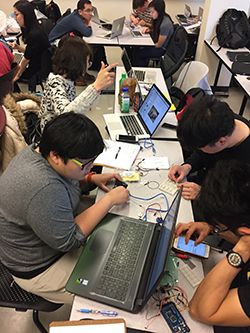Below, two participants share their impressions of the workshop and offer advice for future participants.

Workshop participants hard at work on their collaborative designs. (Courtesy of MIT OpenCourseWare.)
Ronit, MIT student
Impressions
The most exciting thing about this workshop is getting to be with a group of other students who are extremely creative and passionate about their interests. At one point, we did an improv exercise in which we generated project ideas, and the ideas that people came up with were just so fascinating. People are thinking so big here; they’re really trying to solve the world’s problems.
Advice
My advice for future workshop participants is to become familiar with the possibilities and limitations of what you can do with Arduino. There are hundreds of Arduino projects and resources online. Get an idea of what’s out there, of what you can accomplish in this workshop.
Hairuo, Stony Brook University student
Impressions
Initially, I found the teamwork in this workshop challenging because all of us seemed to want to implement our own project ideas. But then I realized that it was be better to listen to someone else’s idea and try to work on it. When we ran into challenges, we’d introduce other ideas and try to mesh them with the original vision for the project. I realized teamwork was all about combining ideas.
The instructors were really helpful in facilitating teamwork. For instance, they had us introduce our names in a playful and creative way. As a result, I remembered lot of participants’ names, which is not normal for me! They also encouraged us to speak with our teammates openly and to keep the teams fluid. The focus was on working on projects that we found engaging with people we found engaging. I made a lot of friends.
Advice
I encourage people with diverse interests to takes this workshop—even people who know nothing about electrical components—because, in this century, technology is everything. With sensors and a little bit of programming, you can make a difference in many fields: if you’re a musician, make a dancing robot; if you’re a biologist, build soil testers using sensors. The possibilities are endless.
